
Click play below to listen to our phonics confessions and what we wish we knew about intervention in upper elementary.
Are you feeling a little lost when it comes to teaching phonics and supporting struggling readers in upper elementary? You’re in good company! In this month’s Dear Stellar Teacher episode, Emily and I are baring it all with our phonics confessions—sharing the biggest mistakes we made in the classroom and how we’ve learned (the hard way!) what really works when it comes to intervention and decoding support.
We get honest about why we didn’t prioritize systematic phonics instruction, how we let intervention become someone else’s responsibility, and why we regret not weaving in more phonemic awareness activities in our upper elementary classrooms. Spoiler alert: It wasn’t because we didn’t care—it was because we didn’t have the knowledge or confidence to know where to start.
If you’ve ever felt overwhelmed by the science of reading or unsure how to support your older students with foundational skills, this episode is for you. We’re here to help you avoid the same mistakes and give you permission to learn right alongside your students. And don’t miss next week’s episode, where Emily will share all about our brand new Reading Intervention Kit—created to make intervention easier, more effective, and way less stressful!
Do you have a burning question you want us to explore on the podcast? Or maybe you have an amazing story that deserves a shout-out? We’d be thrilled to feature your question or stellar story on the show! Simply fill out this form. We can’t wait to hear from you!
In this episode on teaching phonics and intervention in upper elementary, we share:
- How we mistakenly thought intervention was only the interventionist’s job
- The importance of teaching phonics rules and the 86% of English that actually does follow them
- Our struggles with systematic and explicit phonics instruction (and what we’d do differently)
- Why phonemic awareness is essential in upper elementary—even for older students
- The realities (and challenges) of using decodable texts in upper elementary classrooms
- Simple steps and mindset shifts that can help you support struggling readers right now
- The misconceptions we had about phonics in upper elementary—and how they held us back
- How you can avoid these same pitfalls and create a more supportive classroom for all learners
Resources:
- Join The Stellar Literacy Collective
- Fill out the Dear Stellar Teacher form for a chance to be featured on a future episode.
- Sign up for my Private Podcast: Confident Writer Systems Series
- Sign up for my FREE Revision Made Easy email series
- If you’re enjoying this podcast, please leave a review on Apple Podcasts!
Related Episodes and Blog Posts:
- Episode 255, Dear Stellar Teacher: How to Navigate Changing Grade Levels with Confidence
- Episode 251, Dear Stellar Teacher: Our Writing Confessions (and What We’d Do Differently!)
- Episode 238, Dear Stellar Teacher: How Can I Reach My Goals Without Feeling Overwhelmed?
- Episode 234, Dear Stellar Teacher: What’s the best way to teach comprehension strategies and skills?
Connect with me:
- Join my newsletter
- Shop my TPT store here
- Subscribe to our YouTube channel
- Instagram: @thestellarteachercompany
- Facebook: The Stellar Teacher Company
More About Stellar Teacher Podcast:
Welcome to the Stellar Teacher Podcast! We believe teaching literacy is a skill. It takes a lot of time, practice, and effort to be good at it. This podcast will show you how to level up your literacy instruction and make a massive impact on your students, all while having a little fun!
Your host, Sara Marye, is a literacy specialist passionate about helping elementary teachers around the world pass on their love of reading to their students. She has over a decade of experience working as a classroom teacher and school administrator. Sara has made it her mission to create high-quality, no-fluff resources and lesson ideas that are both meaningful and engaging for young readers.
Each week, Sara and her guests will share their knowledge, tips, and tricks so that you can feel confident in your ability to transform your students into life-long readers.
Tune in on your favorite podcast platform: Apple, Google, Amazon, Spotify, Castbox, and more! If you’re loving this podcast, please rate, review, and follow!
Podcast (stellar-teacher-podcast): Play in new window | Download
Sara
Hey there, teachers. Welcome back to the podcast, and today you are in for a real treat because I am joined by my teammate Emily for another segment of Dear Stellar Teacher, which is our monthly series where we have more of a casual, real-talk conversation about teaching. I love it when Emily gets to join me on the show—of course, I hope you do too. These episodes, to me, feel kind of like a behind-the-scenes chat of things that we talk about during our curriculum meetings and team meetings, so really, it’s like we’re inviting you to pull up a chair and join in our conversation. We hope this gives you some encouragement, ideas, maybe a little bit of laughter along the way, and book recommendations—because we always talk about that.
So Emily, welcome back to the show. Super excited for our conversation today.
Emily
Hey, Sara. I’m so excited too. A couple of months ago, we did our writing confessions, and after that episode, it was like I had just gone to therapy or something—like a weight was taken off my shoulders. So I’m excited today to talk about our phonics confessions.
Sara
I know. I kind of feel the same—except also like a weight has been taken off my shoulders, and still, I feel very guilty about all the writing mistakes that I made. I’m like, “Oh, if only I could go back and do a redo.” I feel like I made a lot of mistakes when it comes to teaching writing, but I made even more mistakes when it came to how I approached phonics and intervention in my classroom.
Emily
Okay, well, that’s where you and I swap. So…
Sara
I know you were like a phonics all-star.
Emily
No, not an all-star! But I did know a little bit about phonics when I was in the classroom, which was good, but it was almost like a “too little, too late” kind of thing, you know? Yeah, I’m excited to jump in today and talk about all those things that shoulda, coulda, woulda.
Sara
Absolutely. Well, before we do that, let’s just chat a little bit about what you’re—what are you reading? Are you reading? Do you have any book recommendations?
Emily
Well, this will be a short conversation because I have just not been reading recently, which I think is totally fine. But I did want to share, because this is something that I think about a lot. Some of my friends will say things like, “Oh, I’ve only read five books this past year,” things like that. And some of our listeners probably can relate to this too. But this is one of my favorite soapboxes to get on because the statistics for the United States show that if you have read five books in a year, then you are in the top 33%. So if you are somebody who listens to us talk about books and you’re feeling like, “Oh my gosh, I don’t read that much,” even if you read five, you’re in the top third of American adults. I mean, what’s that say? But also, do not feel bad because that’s—that’s really good.
Sara, you’re probably in this category, but if you read 50 books, then you are in the top 1%.
Sara
That, of course, makes my Enneagram Three heart so happy.
Emily
I know you’re competitive.
Sara
I do like to read a lot, but also, I’m always like, okay, disclaimer—I listen to a lot of audiobooks when I’m in the car, when I’m cooking, when I’m going for a walk, and I also read quickly. I’m just one of those fast processors, and it’s my hobby—like, that’s what I do at night. And we don’t have kids, so I feel like it’s a whole lot easier for me to plow through books. But yeah, I appreciate the fact that you shared that because I know we talk about books a lot on our team, and sometimes there are people on our team who don’t read as much, and they’re like, “Oh, I’ve only read one book this month.” And I’m like, that’s a lot. If you read one book a month, that is a lot!
Emily
Yeah. If you read 10 books a year, then you’re doing better than nearly 80% of American adults. And these statistics are like ones that I have screenshotted on my phone, because anytime somebody brings up the fact like, “Oh, I don’t read that much,” I’m like, “Hang on… Let me tell you…. Feel good about where you’re at.”
Sara
I love that. Well, we all go through seasons, so if you haven’t been reading, I think that’s fine. I definitely have had those seasons. I am in a bit of a nonfiction kick right now, which is very different for me. I’ve read like four nonfiction books recently, and the most recent one—I’m not quite finished with it, but I am close—and it is sort of not my normal book, but it is called Sapiens: A Brief History of Humankind by Yuval Noah Harari. I’m listening to the audio version. I think it’s like 15 hours long or 16 hours long. And it literally is a history of humankind from, like, the beginning to current times. And I’m finding it very fascinating. But usually, when I listen to audiobooks, I listen to them on 1.5 or 1.75 speed, and this one I have to listen to on 1.0 because it’s just—it’s not a topic that I have a lot of background knowledge with. And so it’s definitely stretching me, but I’m finding it really interesting.
Emily
Where did you hear about this book?
Sara
I got the recommendation from a friend because we were having a conversation about human evolution, and we were talking about Homo erectus and Neanderthals and all of that stuff. And so I was very curious because this is not stuff that I regularly think about, but our friend posed this question. We were going to a concert, and he brought this up. And I was like, you think about some really interesting things, and I don’t think about these things. So I was like, I want to learn more. So I just decided to read a book on it.
Emily
Wow. I feel like if you keep doing things like this, you’re going to be ready for like Jeopardy! or something.
Sara
Here’s the thing. I can read things like this, but I don’t retain information, so I couldn’t tell you some of the details, but I’m finding it interesting.
Emily
Well, that’s good. That’s very interesting.
Sara
It’s maybe not something to add to your to-read list immediately, but, you know, I don’t know—maybe, maybe.
Emily
Maybe. I might surprise you.
Sara
Okay, well, like Emily said, we are going to do an episode where we really talk about some of the biggest mistakes that we made when it comes to how we provided intervention and support to our struggling readers. I know, even though I was a fourth-grade teacher, I had students who could not decode. And of course, our goal with these confession-type episodes is to help you avoid some of the mistakes that we made, right? So we’re going to tell you all the things that we wish we would have done differently, and hopefully, you can say, “Okay, I’m going to avoid those mistakes as well.”
Now, speaking of intervention, we’re kind of excited. July, I feel like, is the month of intervention here at Stellar Teacher. Next week, be sure to come back because I’m actually going to be interviewing Emily. So rather than having a conversation, I’m going to be interviewing her because Emily has been our primary creator behind our Reading Intervention Kit that we are creating—our Stellar Teacher Reading Intervention Kit. And this is an intervention kit that is really created with third through fifth grade teachers in mind, and it is the support that we both wish we would have had in the classroom. So next week, I’m going to talk with her all about the why, the how, what’s included, and then our intervention kit officially goes on sale July 21. So mark your calendars—get excited! But for now, let’s kind of dive into the intervention confessions. Emily, what do you wish you would have done differently?
Emily
Okay, so in no particular order, but the number one—well, I shouldn’t say the number one because I just said in no particular order—but I’ll start off with not teaching syllable types. So here’s the interesting thing though: when I taught third grade, I had gone to a 40-hour course that was called Reading Research to Classroom Practice, and it was all science of reading. I loved it so much that I did it twice, and I learned so much in that class. I learned all about the syllable types. So here’s the irony: I knew the syllable types myself, but I never taught my students because I thought it would be so overwhelming. It was almost like, why would I take the time to teach these syllable types? We’ve got bigger fish to fry. But what I should have realized at the time—and I realize now—is that those are foundational steps. Yes, we have bigger fish to fry, but this is going to be one of the first steps that I need to take in order to get my students to start decoding those big words that they’re being exposed to in third grade. So, huge regret. I really should have taken the time to do that.
Sara
It’s funny because I did not teach the syllable types in the classroom, and since I have been out, it wasn’t until I started learning about the science of reading that I even knew there were different types of syllables. So that was, like, a recent revelation for me, but that didn’t even make my list. So I was like, “Oh,” but I was like, “Yep, now that you say that, I wish I would have.” So there’s just, you know, more things—more things to add to my list.
Emily
I know, I know.
Sara
One of the things that I did, looking back, that I feel like was a mistake is, you know, I was a fourth-grade teacher, and I definitely had students who struggled with reading, and I allowed it to be the interventionist’s problem. So my approach was, “Oh, they get pulled out for intervention twice a week, and so it’s the interventionist’s job to catch them up. Like, I’m responsible for grade-level content; they are responsible for helping the students learn how to read.” And I think a lot of that came from the fact that I didn’t have a lot of experience learning how to teach kids how to read. I didn’t have a lot of training, and so I didn’t have a lot of confidence in figuring out, right? I have a student who’s in fourth grade that is still struggling with blends and long vowels. I literally don’t know what to do. And so it’s like, okay, if I just sort of push the problem onto somebody else, then I don’t have to deal with it. And so I think that was—looking back on it—it’s like those students needed the interventionist’s help, and they needed my help as well. And so I think I wish that I would have had more ownership over the decoding challenges, but I was kind of like, “That was K-2. They should have taken care of that. That was their problem, right? This is not my job.” But I’m like, no—it was my job. It should have been my job. And I think my lack of confidence and knowledge was sort of the catalyst for why I was like, “I’m gonna let someone else take care of that.”
Emily
Yeah, I’m really glad that you brought that up, because I think that that is so relatable to so many people. When you teach upper elementary, you’re not necessarily prepared or expecting to have students who have such needs when it comes to those foundational skills like phonics and phonemic awareness. So you’re definitely not alone. And I hear you saying that you maybe lacked the knowledge base to do that, and I know that so many upper elementary teachers do as well.
Sara
I know—it’s like one of those things where I’m like, I wish that more of our elementary teachers had the knowledge and understanding of—yeah, again, I’ve acquired all of this since I’ve been out of the classroom, and I’m intentionally learning about structured literacy and the science of reading. And I know our classroom teachers don’t always have access to training or resources or PD, which is why I’m like, “Okay, it’s so important for us to talk about this,” so that way, as they listen to these podcasts, hopefully they can glean a little bit of knowledge and, you know, learn from our experiences.
Emily
100%. Okay, I’m not sure which one to say next because they both kind of go with that conversation, but I think I’ll go with this one. Okay, so another mistake I made was not explaining phonics rules—slash—not teaching the code and not knowing it myself. So, I mean, people tend to talk about, you know, “English is so complicated,” and things like this, but the reality is, there is an explanation for English. There’s an explanation for the language, whether that’s like the etymology of it, the morphology of it, etc., etc. And I found myself, when I was teaching English—or not English, I mean, I was teaching how to read or spell—I found myself all the time just saying, like, “Oh, that’s just how English is,” or “That’s just—this is just an exception to the rule.” So I almost felt so overwhelmed by the rules. But what I had learned is that 86% of language follows the code or follows the code with one deviation, so we need to be teaching the phonics rules.
Sara
Yeah, for sure, I didn’t do that either. And, I mean, I think similarly to that, right? It’s like, I didn’t teach the phonics rules at all because, you know, it’s like, “Oh, just memorize that, right?” Like, “This is just the exception.” Also, like, when I think back on the things that I did not do, I ignored intervention for a long time, and then there was one year when my school started to use Words Their Way. And so I was like, “Ooh, like a spelling inventory, okay? I’m sort of maybe understanding. It’s like, I need to identify the gaps and then fill those in.” But when we started doing that, we didn’t have any—right? It’s like, “Here’s a new program. There’s no training on it. Here’s the material. Use it with fidelity.” And I’m like, “In all of my free time, right?” I used it, but not correctly. And one of the things I realized is that I did not teach phonics in a systematic or explicit way, right? I was sort of picking and choosing, like, “Ooh, let’s just work on this this week. Let’s work on this this week,” and not going through and figuring out, “Okay, where are they at on the progression, and how can we move them forward?” And I think again, going back to just—I lacked understanding of, like, the big-picture perspective. And so I didn’t realize that phonics instruction really does have to be taught explicitly and systematically. We have to start with the simplest concepts—short vowels, consonants—and move into blends and long vowels before we can get to some of those more complex ones. And I was just thinking I could sort of just, like, plug in the gaps in a random sort of way. And of course, it didn’t work.
Emily
Right. It was almost like building the plane as you were flying it. Like, really? “Yeah, oh, my student missed this word. Okay, let me take this time now to teach this specific spelling pattern.” Yeah, that was one of mine too: not being systematic enough. So similar to you, I would just—like within my small group lesson, formerly known as guided reading—I would have my students at my table, and I’d say, “Okay, we’re going to work on whatever. We’re going to do this phonics activity like, tap it, map it, graph it.” And that’s one of my favorite phonics activities.
Sara
Which, okay, first of all, I’m just like—the fact that you did an activity like tap it, map it, graph it in your classroom, like you’re light-years ahead of what I was doing. That was not happening in my classroom.
Emily
Well, it was definitely a starting point, but the mistake that I made was teaching that in isolation. So I was teaching the phonics skill in isolation, but not extending it further to then, “Okay, now we’re going to practice it in decodable phrases,” or “Now we’re going to practice it in a text.” So another mistake I made was not using decodable texts.
Sara
Yeah. I think part of that is like, we were both sort of like products of balanced literacy, right? Like, decodable texts weren’t…
Emily
Yeah, I mean, who had heard of that?
Sara
I mean, I heard of them, but, you know, sort of like the mentality was like, “Oh, don’t use decodable texts. Like, expose students to real books.” Like, decodable texts are almost—I don’t know—there just was kind of almost like a negative connotation around using them in a classroom.
Emily
Especially upper elementary. I mean, yeah. And I think also, too, it’s like a lack of resources for upper elementary teachers. Like, a lot of these decodable texts, they are kind of, like, stigmatized as being like short vowel patterns, things like that. And you’re like, “We don’t need that. We need, you know, these more complicated spelling patterns that our students are being exposed to.”
Sara
Well, and I think another—again, when I was trying to dabble in this intervention—when, like, Words Their Way came into my life, the materials that were available to teach students in upper elementary—I always felt guilty using them. It’s not—I don’t think this is like a confession where I did this wrong. It was more so I just felt bad having a student in fourth grade sit at my table and give them a book that was created for a kindergartner, because it was, you know, it’s like my students always loved coming to my small group table, and they got so excited. And so it was like, “Oh, yay. Like, what are we going to read? What are we going to learn?” And then I, like, put this book in front of them, and it was like you could almost see them get deflated, like, “I have to read this baby book, and my classmates might see me,” and also, like, “It’s boring, and there’s nothing interesting about it.” And I just always felt so uncomfortable trying to support these students, because I know they also were not excited about reading the books that they needed to because those books were not created for third- and fourth- and fifth-grade students. They were written for kindergartners.
Emily
Yeah, and, I mean, our upper elementary students know—they know, you know. So, I mean, that’s why I’m just so passionate about our intervention kit, because it’s just made specifically for upper elementary teachers.
Sara
I know, I’m excited to talk more with you about that next week, of course.
Emily
Yeah, yeah. I mean, this intervention kit is, you know, my baby—aside from my actual baby. So I am super excited to talk about that.
Sara
Yeah. Okay, I do have one more. But do you have anything else on your confessions list?
Emily
I think I kind of merged two of them together. So let’s hear your last one.
Sara
The last one—and again, I think this goes back to not having an understanding of effective literacy instruction. At no point when I was trying to support students who were in intervention did I ever do any phonemic awareness activities. Yeah, right? It’s like phonemic awareness was not a part of our upper elementary classroom in any capacity—not for grade-level students, not for students who were struggling. And again, I always had this assumption that, like, okay, phonemic awareness is something that happens—I knew about it, right?—but it’s something that happens in pre-K and kindergarten and first grade. And, you know, not realizing that having the phonemic awareness foundation is really essential and necessary in order to get students to ever be able to decode. So again, I think when I think back on all of my mistakes, it really comes down to me not having enough literacy content knowledge to know what materials to look for, to know what routines to put in place, to know, like, what tools to give my students. And you know, which ultimately then led to me outsourcing this intervention, which was kind of the wrong approach.
Emily
Yeah, well, I’m really glad that you brought up phonemic awareness, because it is so important. I mean, that is one of the key predictors of a successful reader. So it definitely needs to be taught systematically. Which I did do phonemic awareness drills with my third graders, and they loved them. They really did. There are phonemic awareness activities that are, you know, more challenging for our upper elementary students. I mean, again, phonemic awareness is such a big part of the lower grades, but as we’re seeing students come to us with all these gaps even in the upper grades, phonemic awareness—five to ten minutes a day—can be a game changer, for sure. So I mean, phoneme deletion activities, segmentation, phoneme swaps—these are all like brain teasers.
Sara
I think when you approach it that way, with the big kids, it’s fun for them, right? Because it’s like, ooh, especially if it’s like the manipulation, where it’s like they’re swapping out sounds, or, I know, like at the very advanced level, even doing like Pig Latin.
Emily
I know. I never understood that.
Sara
I didn’t either!
Emily
I’m obviously not phonemically aware because I was never good at Pig Latin.
Sara
No, but some of those activities, even in the upper grades, still are challenging and fun for students.
Emily
Yes, for sure.
Sara
Anyways, hopefully teachers, if you are listening and you can relate to anything that Emily and I said, don’t feel bad. Because we did these things in the classroom. We wish we could do them differently. But luckily, if you are listening and still in the classroom, you can learn from our mistakes. And especially if you’re now sort of wondering, “Okay, I am outsourcing intervention to the interventionist. I’m not teaching phonics, I’m not doing phonemic awareness, I’m not teaching things systematically and explicitly.” If you’re sort of wondering what you should be doing, come back next week, because, like I said, I’m going to be having more of an interview-style conversation with Emily, where she really is going to break down everything that’s included in our intervention kit and give you some really practical tools and steps that you can take to be a more competent and effective interventionist for your students that struggle.
Emily
I’m so excited—to use our favorite word.
Sara
Haha! I know—super excited. I’m elated. Well, Emily, I can’t wait to have you back here next week.
Emily
Sounds good. See you then.

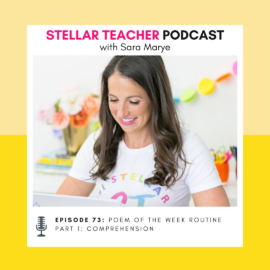
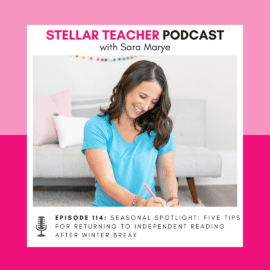
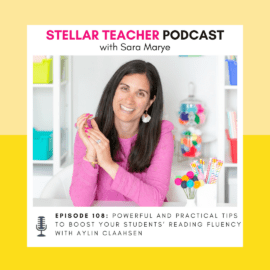
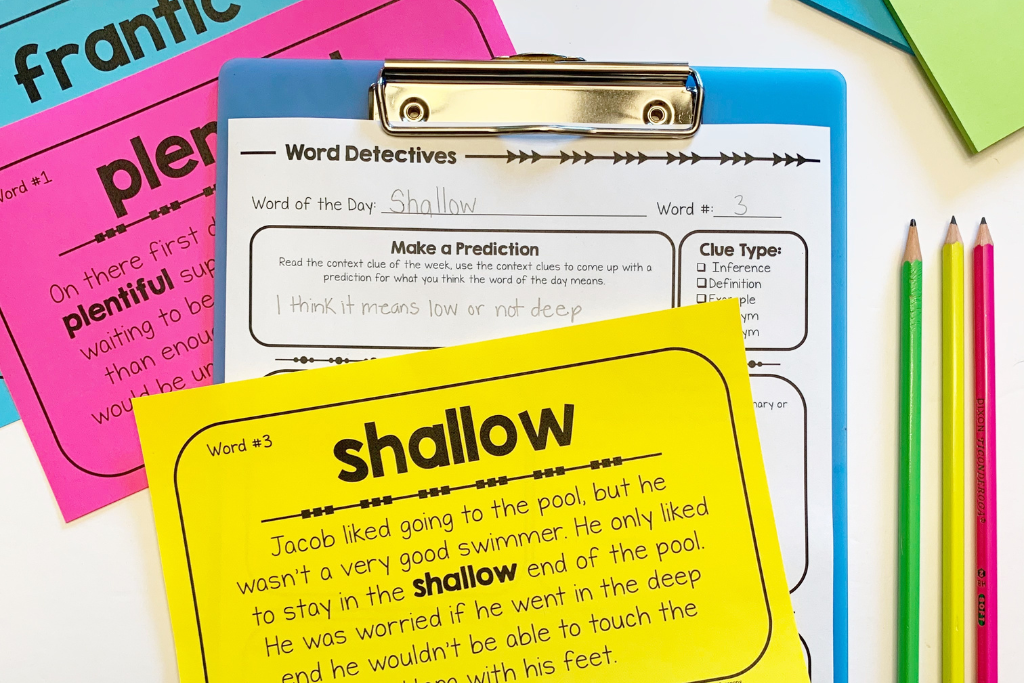
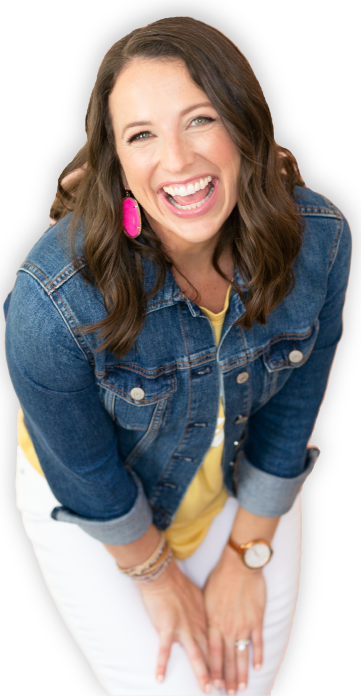
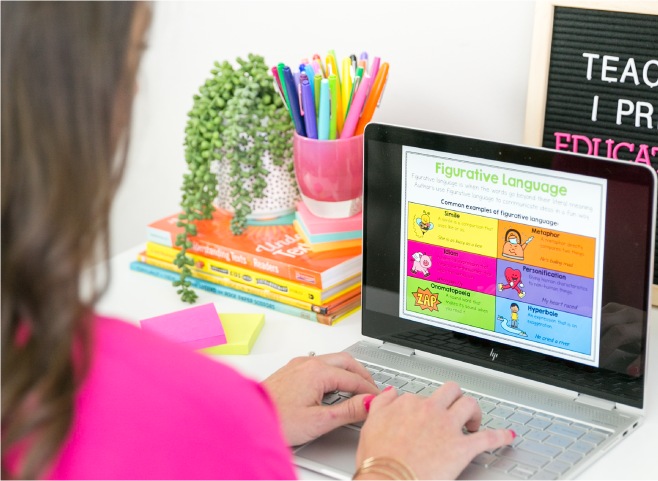
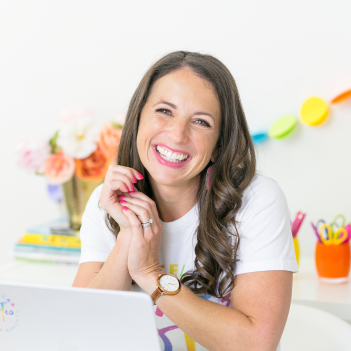
Leave a Comment
You must be logged in to post a comment.